 Cultivating truth, goodness, and beauty grounded in the Christian worldview
Cultivating truth, goodness, and beauty grounded in the Christian worldview Cultivating truth, goodness, and beauty grounded in the Christian worldview
Cultivating truth, goodness, and beauty grounded in the Christian worldview

Finish lines are important. The finish line at the end of a marathon, a graduation ceremony, and a ribbon-cutting ceremony all serve as important moments where we slow down and celebrate God's goodness and provision for his people. By the grace of God, we have completed a major accomplishment. The fiercest utilitarian might consider such celebrations a waste of time. They might even grumble, "The race never ends... get back to work." God has created us to work. But He has also created us to rest and to celebrate (Philippians 4:4-7).
This week is a time to celebrate. We were surprised and delighted to find this picture from February of 2017 showing seven of our Stonehaven girls during their legendary meeting with the Stonehaven administration that I mentioned in my April 29th message. This memorable meeting with our now Seniors was the genesis of the launching of our Upper School. It was the seed of the thriving oak tree we enjoy today.
You can have a graduation without a building. You can have a graduation without a Head of School. You can have a graduation without money. But you can't have a graduation without graduates. For their perseverance and commitment... for their passion and their joy... for their boldness in being the pioneers of an institution that will have an impact on so many... we say thank you. "The Lord bless you and keep you; the Lord make his face shine on you and be gracious to you; the Lord turn his face toward you and give you peace" (Numbers 4:24-26). Amen.

Imagine hosting a number of your friends at your house for a Christmas party. Said Christmas party is a huge hit; Vibrant, fun, and full of vim and vigor. You then consider the question, "How can I do this again next year?" There were many elements of the party that might have contributed to its success including the food, the music, and one raucous version of Twister. But of all the contributing factors, the most important would certainly be the particular group of people involved in the festivities.
As Stonehaven experiences significant growth, the question we ought to ask is, "How can we maintain our culture and identity as we grow?" This is a crucial question. Although enhancing curriculum and reviewing our policies play a role, one of the most important ways we keep our culture is by keeping our people. Stonehaven has been blessed with faithful staff members, devoted parents, thoughtful Board members, and beautiful children.
As we continue celebrating our 20th year anniversary, we can see that the school has most thrived when we have retained our teachers, board members, parents, and students. Those that have been at Stonehaven the longest possess an "institutional memory" that is so vital to maintaining our culture. These individuals that know and understand our mission call us back to our founding principles. As we near the end of another great year at Stonehaven, we might be wondering, "How can we do this again next year?" The answer is both easy and hard; Keep our people.
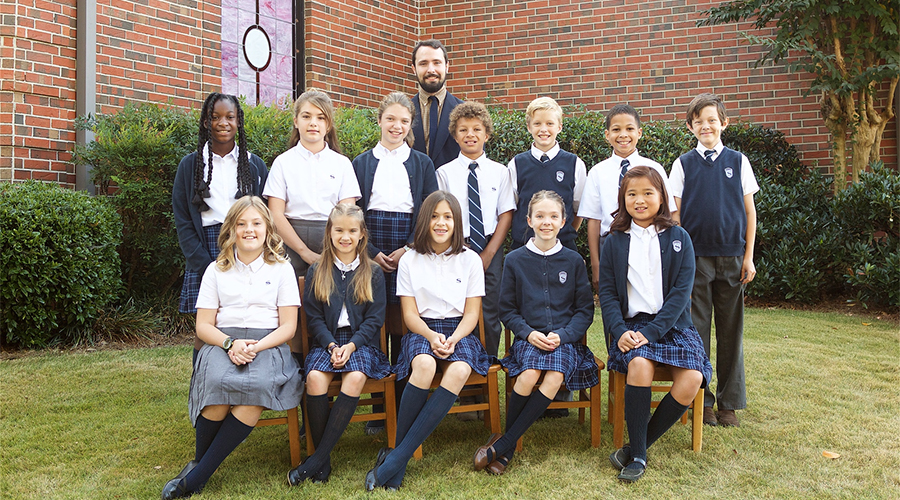
In October of 2016, Stonehaven was addressing some relational issues with our fifth grade class. The proverbial pot was boiling over between the boys and the girls in the class. The boys accused the girls of being quick to "tattletale" on the boys to get them in trouble. The girls accused the boys of calling them names and provoking them on the playground. The situation felt heavy for both parents and teachers; "These issues have been persisting for years. Will these kids ever get along with one another?"
I'd love to say that we did a few trust falls and all was made right in the world. But, the truth is that it required faithful intervention and a degree of patience before these issues were reconciled. We engaged in several meetings and conversations with the children and their parents. Team-building exercises were part of the program but resolving relational struggles often requires both attention and time.
Later that year, a group of fifth grade students would schedule a meeting with the school's administration to challenge them to start an Upper School program. One could say, "the rest is history." This fifth grade class is now approaching their Stonehaven graduation in less than a month. The very same children struggling with their peers were saying, "And we want to hang out with these numbskulls until the 12th grade." In retrospect, we can now see how the Lord was using those very struggles for their good (Romans 8:28, 1 Peter 5:10). As Reeepicheep says in the movie The Voyage of the Dawn Treader, "Hardships often prepare ordinary people for an extraordinary destiny."

This past Friday, as the Lower School students passed through the Mr. Edwards Oobleck station at the science museum, I asked them to describe the characteristics of a great scientist. A child is naturally tempted to think that the goal of education is to equip the student so that he knows all the "right answers." However, I like to remind the students what the English philosopher Roger Bacon said, "half of science is asking the right questions." Or as it says in Proverbs 25:2-3, "It is the glory of God to conceal things, but the glory of kings is to search things out. As the heavens for height, and the earth for depth, so the heart of kings is unsearchable." Although a good education certainly seeks to provide many answers for the student, one of the central aims of a classical liberal arts education is training our children to ask good questions.
As we look forward to celebrating our seniors as they graduate this May, we know we have not given them answers to all of life's questions. We do trust that Stonehaven has rooted them firmly in the core doctrines of our Christian faith; The fundamental truths governing their life and purpose. Yet, they do not "know it all." One of the threats of a rigorous classical education is to think you know more than the 'public school kid' down the road. "When pride comes, then comes disgrace, but with the humble is wisdom" (Proverbs 11:2). My prayer is that our graduates know much but more so that they are trained to use this knowledge with wisdom and grace.

Today's celestial event should evoke wonder and awe from everyone whether they observe total obscurity or only partial eclipse, but it has me thinking about the tension between permanence and change. Perhaps this inclination is seasonal for me as my team and I prepare, for the first time in the school's twenty-year history, to host three Stonehaven transitional events: a Crossover celebration, a Convocation dinner, and a Commencement ceremony.
At Crossover, Stonehaven staff marks the transition from grammar to logic school as their current homeroom teachers recognize rising 7th graders' accomplishments and character moments before they navigate a footbridge to the welcoming cheers of Upper School leadership. At Convocation, Stonehaven mentor teachers present virtue stones with words of commendation and encouragement to our rising 10th graders as they transition from logic to rhetoric school. Stonehaven's Commencement will celebrate the fruition of all the ways the Class of 2024 embodies our Portrait of a Graduate.
Like today's eclipse, academic transitions come with anticipation, disruption, joy, and, perhaps, disquietude. "I cannot believe we are actually here," I hear each year at these transitional events, which I interpret as parents' expression of a strange emotional cocktail of simultaneous gratitude and grief because change seems to signal both progress and irreversibility.
Puritan theologian John Owen observed in The Glory of Christ, "When the sun is under a total eclipse, it loses nothing of its native beauty, light, and glory." Transitions are meant to be felt, observed, and celebrated, yet, as Hebrews 13:8 reminds us, "Jesus Christ is the same yesterday and today and forever." And, as I remind our Stonehaven alumni, "You are always a Knight."

The Gala this past Friday evening was a beautiful reminder of the ethos of our school community. The words that come to mind include vibrant, grateful, and joyful. In this special year at Stonehaven we strive to commemorate and celebrate twenty years of Glorifying God by cultivating truth, goodness, and beauty in our children. It truly was a beautiful evening.
I reminded our community on Friday of God's call on our lives to take on heavy responsibilities. As Jordan Peterson would say, "pick up the heaviest thing you can and carry it." Imagine a group of young men who have been asked to transfer a pile of rocks from one location to another. The first boy, also the oldest and strongest boy in the bunch, approaches the pile and looks for the lightest rock in the pile. After a few minutes he picks up a relatively small rock with ease and slowly walks on his way. "Hey Bruno, is that really the best you can do?!"
We shared with our community the "heaviest thing" on our list and our excitement to carry this awesome burden for the coming years. With the significant growth in our school's enrollment, we are launching Phase I of the Crescendo Capital Campaign. We are asking our school community to join together in raising $7.4 million for this effort. This is the biggest project to date and we need everyone's help. We begin this campaign with trust and faith that the Lord will provide for every need of our school. We will be reaching out to all in our community in the coming months with opportunities to learn more about how you can support the project.
Article Link
I imagine that many might question the value of reading books written 2,000 years ago. How can reading the thoughts of an ancient Greek philosopher be of practical value today? A few years ago, as I was reading Aristotle's Nicomachean Ethics I remember being startled by the immense practicality of the book.
One of the more memorable admonishments was when he argued that, "slowness of movement seems to be the mark of a great-souled man... for he who is serious about few things is not given to hastiness." Some translations will word "slowness of movement" more specifically as "slow step." As a young teacher, I developed a bad habit of walking quickly. I justified the hastiness by my commitment to getting things done... "I've got things to do and no time to waste!" If I walk quickly, I can do twice as much as the average schmo. Aristotle would not have agreed and I had to reconcile my quickness of movement with his wisdom.
We read the Great Books at Stonehaven because they compel us to participate in the Great Conversation: A conversation where we ask and answer the most important questions of human existence. Our children are forced to read, consider, and wrestle with the great ideas of history. Aristotle's discussion of a "great-souled man" is seeking to define the characteristics and routines of a person worthy of great things. Even though Aristotle lived in a very different world than we do today, the truth of his words is as true today as it was 2,000 years ago.
Article Link
One of the great mathematicians of the early 20th century G.H. Hardy once remarked, "I have never done anything 'useful'. No discovery of mine has made, or is likely to make, directly or indirectly, for good or ill, the least difference to the amenity of the world." Mathematicians dedicated to 'pure' mathematics will often take pride in the 'uselessness' of their mathematical studies. Ironically, many of the supposedly 'useless' mathematical endeavors have ultimately contributed to very useful applications. A committed pacifist, Hardy fortunately did not live long enough to see that his 'useless' work with prime numbers would be used by the Pentagon to develop the military's most secure codes.
Hardy's boast above begs the question. What is the best form of education; one focused on utility or one focused on the pursuit of truth? As Hardy would have learned, God has designed the world in such a way that the pursuit of truth often uncovers some of the most useful ideas. In other words, beauty is surprisingly useful. In Les Miserables, Victor Hugo puts it this way, "The beautiful is as useful as the useful... Perhaps more so."
I often caution our community to focus on the utilitarian ends of education. This feels like the ditch we are in at this current cultural moment. This focus should not be misinterpreted as an aversion to an education that is 'useful'.
What should be the primary target of our academic program? A Stonehaven education will be very useful. However, we should be careful to make this the primary target of our school. The Greek mathematician Euclid was once asked by a student, "But what do I gain from this?" Euclid turned to his assistant and said, "Give the boy a penny for he thinks he must gain from everything he learns." Our children will understandably ask their teacher; "When will I need to use this?", "How is it useful to memorize digits of Pi?", "How is singing four-part harmony preparing me for college and work?" If these questions drive our academic program, we will certainly question the value of memorization, cursive, history timelines, singing, chapel, art, geography, obscure mathematical equations, the transcendental number Pi, and any other academic concept that doesn't have a straight line to a successful career path.
A Stonehaven education cultivates truth, goodness, and beauty in our children first and foremost. Find the true, do the good, and love the beautiful. And don't be surprised when you find these things incredibly useful.
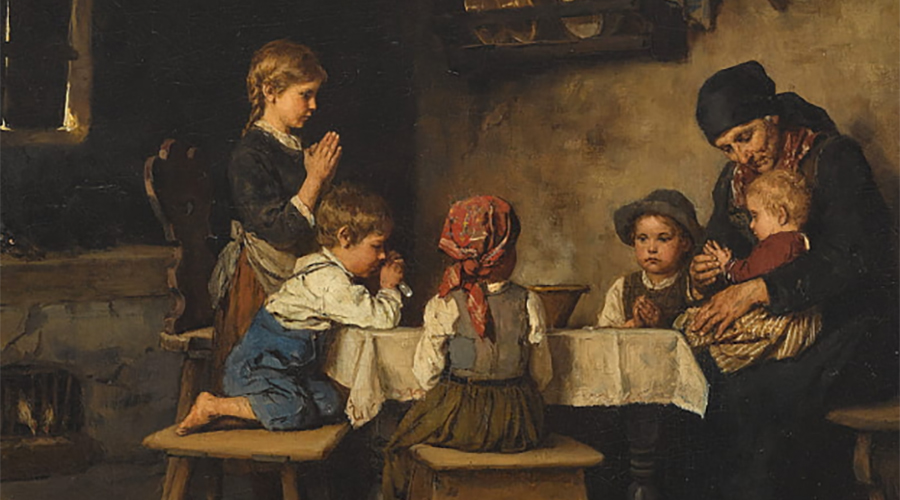
We've all been there: that awkward moment when you've asked a child to pray, perhaps at a family gathering or a church event, and there's a long, uncomfortable pause. "Dear God," she finally begins, voice quivering, "help us... to have... a good day. Amen." Now, of course we believe that God hears such prayers from children who belong to Him (cf. Matt 19:14), and yet it doesn't take a theologian to see that there is what we as educators would call a "growth opportunity."
At Stonehaven, we recognize that children need training in how to pray. Indeed, Christ's disciples recognized that they needed training in prayer, despite having been steeped in the traditions of Judaism: "Lord, teach us to pray, as John taught his disciples" (Luke 11:1). Jesus, far from rejecting this as a silly question or simply telling them to pray according to whatever came into their own minds, instead taught them by giving them the Lord's Prayer (Luke 11:2-4).
We too have a responsibility to teach our children to pray. But how? At Stonehaven, we believe that having students memorize some of the best written prayers of our Christian heritage can provide an important "school for prayer." To clarify up front: this is not to suggest that praying memorized prayers is the only, or even the best, way to pray in all circumstances. Different Christian traditions, for example, place different emphases on the role of memorized prayers in corporate worship or private devotion.
Why, then, should we have students memorize prayers?
There are many reasons, but at a foundational level we have students memorize prayers for the same reason that we have them memorize Scripture (after all, the best prayers are those that weave together various pieces of Scripture), not to mention classical hymnody, poetry, or anything else worth committing to memory. As a classical school, we believe that memorization is important because it allows particular words, phrases, and even syntactical patterns to soak into our souls, beginning a process of rumination and regurgitation by which these things become part of our own habits of speech and, indeed, our very lives.
Prayer memorization has at least three other significant benefits. First, it provides an opportunity for training in theology. Good prayers aren't simply a laundry list of requests we set before God; no, prayers worth memorizing actually teach us something about God, our world, and ourselves. This gets at a second benefit of prayer memorization, which is that it can broaden our categories for prayer. The default for most children (and, alas, many adults) is prayer for one's own needs or perhaps the health needs of loved ones; as important as these are, there are, in fact, quite a few other very important things that the Bible commands us to pray about (see, for example, 1 Tim 2:1-2). Third, when we pray traditional, time-tested prayers, we discover that we are actually praying along with the whole communion of saints across time and space who have said these very same words. Our common prayers allow us to participate with the worship of the larger Body of Christ.
How, then, can teachers or parents go about the process of finding prayers for our students to memorize? For its sheer poetry, the Book of Common Prayer is unmatched for its collection of beautiful prayers from Christian history, most of which should be broadly acceptable to Christians from all backgrounds. Within the Reformed tradition, the Puritan collection of prayers found in the book The Valley of Vision might prove particularly inspiring. Many such prayers have been collected in our "Stonehaven Book of Prayer & Praise" for use in chapel and at home. In this way, we can begin the process of inviting our children into "schools for prayer."
Let us, then, go forth and raise up a generation of young men and women who can pray boldly, their words rich in goodness, truth, and beauty!
Note: This post is adapted from an article Dr. Hughes wrote for the Beza Institute for Reformed Classical Education. Check out the full article here.
Article Link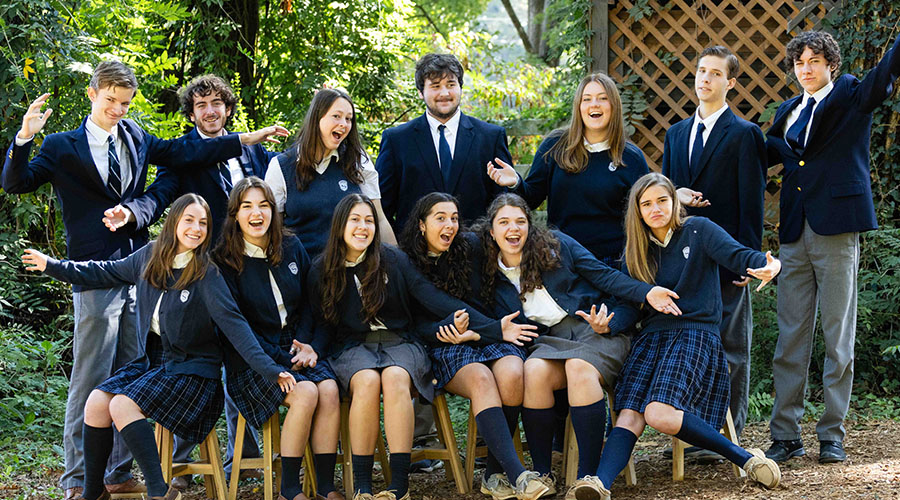
It's hard to believe that in less than three months, our school will be graduating its first senior class. What an exciting time for our students and for our school. As we approach this milestone, I encourage all of our families to review Stonehaven's Portrait of a Graduate - a statement that reflects our constant prayer for all of our students. It's been a privilege to see how our seniors have grown into this vision over the past four years. Seeds planted in the grammar and logic phases are bearing fruit as they consider their next steps, set an example in our school, and work hard to "finish strong" as they dive into their Senior Capstone projects. In these projects, students have chosen important questions to engage with through the lens of Scripture. In topics ranging from the death penalty to NIL deals in college football, these seniors are examining difficult questions that require them to "listen carefully, reason soundly, speak precisely, and articulate persuasively." To develop these habits of mind is to do something increasingly counter-cultural and will certainly serve them well as they move on to new opportunities. As they prepare to present their research in the coming months, our prayer is that the Lord would use the experience to further equip them to serve as witnesses to the goodness of our God by leading with gratitude, humility, and grace. Be on the lookout for more details about the Senior Symposium and Exhibitio in the Knightly News soon!

God's people are called to a life of feasting (Leviticus 23:40) and fasting (Matthew 6:16-18). Although I have a passion for the former, I have struggled to gain a similar appreciation for and devotion to the latter. Let's call it a growth opportunity. Many Christian traditions recognize the season of Lent as a time to commit ourselves to the spiritual discipline of fasting. This is to remember the forty days Jesus Christ spent fasting in the desert and enduring temptation by Satan (Matthew 4:1-11). Tomorrow, we will be forty days from Easter. From Moses to the apostle Paul, the Scriptures describe fasting as an important practice increasing our dependence upon God and helping us draw near to Him (Exodus 34:28, Matthew 9:15, Acts 9:9).
Are we giving our children an example of fasting that they can emulate? As a child, my church did not expose me to a robust theology and vision for fasting. Unfortunately, our culture is surely not going to help in this regard. Imagine Apple running a commercial during the Super Bowl encouraging Iphone users to take a phone break or Bud Light running a campaign asking their consumers to abstain for forty days. Such training will have to come from their church, family, and school.
What can fasting teach us? When done right, it will cultivate a yearning for God's kingdom. Pastor John Piper says, "We are putting our stomach where our heart is to give added intensity and expressiveness to our ache for Jesus." If we want to see ourselves and our children ache for Jesus, let us commit ourselves to the practice of fasting.

Lurking in the shadows of Taylor Swift and the 2024 presidential election is an approaching scientific event of epic proportions. This event last occurred in the year 1803; rarer than the much-celebrated solar eclipse of 2017. Arguably more fascinating than a certain relationship between a popular musician and her football player boyfriend. For those late to the party, two broods of cicadas, the Great Southern Brood and the Northern Illinois Brood, will both emerge at the same time this spring. NBC reporter Denise Chow proclaims, "It's official: 2024 belongs to the cicadas." In a CNN article, science writer Kate Golembiewski speaks of this event as a "cicadapocalypse" where a "month-and-a-half period will be jam packed with loud singing, mating and then dying like 'the most macabre Mardi Gras that you've ever seen.'" Although portions of northern Georgia will see and hear the assault of the Great Southern Brood, we won't be visited by the Northern Illinois Brood.
This scientific anomaly certainly provides an impressive amount of "fodder" for study in a biology class. One scientific study states the 13- and 17- year periodical cicadas are among the "most studied" insects in ecology. What I find particularly fascinating though, is the surprising opportunities for integration as we look at this rare confluence of cicada broods. Math, history, Bible, literature, art, music, and even culinary arts teachers could all find interesting ways to integrate their subject with the coming "cicadapocalypse."
In pre-algebra, students are expected to learn how to find what is called a least common multiple; the smallest number that two or more numbers can divide into evenly. In April, might I suggest that math teachers ask their students to find the least common multiple of 13 and 17? These two numbers are the periodical cycles of these two broods. The result to this elementary math problem would tell the student how often these two broods will emerge in the same year; once every 221 years. In addition, some researchers believe that the 13- and 17- year periods are prime numbers for a very strategic reason; it makes them "less likely to be killed by predators that have 2- or 3- year life cycles."
Additional opportunities for cicada integration include:
Karen Glass, the author of Consider This, says, "Synthetic thinking can be understood as an approach to knowledge that places things together, comprehending the relationship of new knowledge to old knowledge, one discipline to another, and man to all things." I remember when I was middle and high school going from class to class, subject to subject, and wondering, "What is the purpose of all this?" My education seemed so fragmented and unrelated. A word that describes well my education was 'disintegrated.' Each class was its own little silo and the teachers certainly weren't having meaningful discussion about the integration of knowledge.
Classical Christian education is seeking to bring things together rather than divide them apart. Charlotte Mason said that, "Our nature craves after unity." Our children have an innate desire to see how things relate and connect to each other. Learning that prime numbers might have a connection to the emergence cycle of cicadas is fascinating. They are delighted and inspired when their teacher makes important connections between history and science, literature and religion, and music and mathematics. Glass continues saying, "This understanding, of a single source of all knowledge, and further, of the interconnectedness and wholeness of knowledge, is one of the hallmarks of classical education as it was developed and formalized during the medieval and Renaissance eras." All of creation comes from the mind and hands of God. Therefore, we should not be surprised when we uncover the interconnectedness and wholeness of his world.
Article Link
Last month, Jannik Sinner, an Italian 22-year-old former ski champ turned tennis pro won his first Grand Slam at the Australian Open. Tennis fans will know him for his powerful forehand and his adoring fan club, who dress up as carrots (a nod to Sinner's red hair). More interestingly, though, is how he is widely known for his genuine and consistent humble demeanor on and off the court. Our goal at Stonehaven is that our students, too, will be known for their humility, as well as gratitude, respect, and responsibility. We are committed to cultivating these virtues not just during the school day but also in our athletic program. This is learned through simple acts like thanking the coach after every practice, high-fiving opponents after a win or loss, humbly accepting a bad call from a referee, and leaving a court/field/track "better than they found it".
End-of-season celebrations probably best sum up how our athletic program seeks to carry out this goal of complementing the school's mission and vision of glorifying God through truth, goodness, and beauty. They are always a fun time of gathering together as a team over a meal, and the highlight of the events is when our coaches recognize each student with an award that describes how he or she has grown athletically and spiritually/in godly character that season. Students may get recognized for being the fastest runner or the most improved, but perhaps more significantly, they are celebrated for displaying character such as perseverance, courage, or kindness, throughout the season. In doing so, we are reminded of the goal of our athletic program: to further instill Christian virtue into the moral fiber of our children, with the deep understanding that athletics provides a unique and awesome opportunity to put this into practice. In so doing, our prayer is that our children are building not just their physical, but also their spiritual, muscles to "run with endurance the race that is set before us, looking to Jesus, the founder and perfecter of our faith" (Hebrews 12:1).

What time is it? The importance of such a simple question should not be underestimated. Jesus, after all, castigated his opponents for failing to rightly "interpret the signs of the times" (Matt 16:3), which led them to miss the coming of the Messiah. Much better, then, for us to be like the men of the tribe of Issachar, who rallied to David because they "had understanding of the times" (1 Chr 12:32). How we as Christians read the present cultural moment greatly impacts how we approach the task of educating our children.
In seeking to discern the signs of our times, Aaron Renn's "Three Worlds of Evangelicalism" is a very helpful way of analyzing how Christians have engaged and been received in the public square as the process of secularization has proceeded in America. Most notably, Renn identifies a shift that took place around 2014 from what he calls the "Neutral World" to what he terms the "Negative World." Whereas the former was characterized by a lingering receptivity to Christian beliefs and morality, the remnants of a "Positive World" that saw Christian morality as normative for society and linked Christian faith with good citizenship, the latter is strikingly hostile to traditional Christianity, imposing a genuine cost, social and otherwise, to those who would seek to follow Christ.
How, then, does this impact how we think about Christian education?
In the "Neutral World," we saw the growth of Christian college-preparatory schools, which aimed to prepare graduates to engage culture on its own terms, including on the most elite secular college campuses and in the most prestigious professions. Their aspiration is often captured in mission statements regarding graduating students who will "transform their world for Christ" or something of that nature.
In the "Neutral World" it may have been possible to find missional success through a strategy of downplaying controversial issues and seeking to find common ground with culture at large. Even then, however, this strategy may have been less successful than its advocates claimed; those Christians who rose to positions of power and influence often found themselves more transformed by the institutions in which they served than vice versa. In any event, in the "Negative World" it appears far less likely that simply having a "winsome" Christian witness will win over society, much less be able to resist those de-formative pressures increasingly brought to bear upon young people today.
And therein lies the rub for the Christian college-preparatory school model: to the extent that its telos is bound up in prestigious college admissions and career success, it is vulnerable to the pressures of society more broadly and college admissions offices more specifically. The pressure in the "Negative World" will always be to compromise away from traditional Christian orthodoxy, to chip away at the school's mission in order to allow for graduates to still achieve worldly "success." Unfortunately, it is all too common to see a Christian vocabulary applied to the various aspects of a school's work without any actual transformation of what the school is doing or how it is operating. While this tension may have been present in the college-preparatory model from the beginning, the shift to the "Negative World" will only further destabilize this approach to Christian education as it imposes ever greater costs in pursuit of its stated aim.
There is, thankfully, another option available to Christian parents. In this "Negative World," classical Christian education provides a durable alternative to the model of Christian college-preparatory schooling. As many ACCS schools have demonstrated, it is possible to avoid the de-formative pressures of the college-preparatory model without slipping into a fundamentalist, anti-intellectual, world-denying posture. The telos of cultivating goodness, truth, and beauty by preserving and transmitting the Great Tradition that is our common heritage anchors schools like Stonehaven amidst the tides of liquid modernity. It will, we hope, be graduates of schools like ours that will be best poised to rebuild our colleges, workplaces, and communities when our national collective fever breaks and the work of rebuilding begins anew.
Undoubtedly, there are many Christian college-preparatory schools staffed with teachers and administrators of true conviction who are doing their best to form their students for Christ. How much more, though, should we in the classical Christian education movement lead the way in creating the kinds of Christian schools that will not only survive but thrive in the "Negative World" and whatever else may lie ahead. Let us, then, be prepared to stand, contra mundum, for the sake of Christ our King.
Note: This post is adapted from an article Dr. Hughes wrote for the ACCS magazine Classis: Kyle R. Hughes, "Christian Education in the Negative World," Classis 30.3 (2023): 9-11.
Article Link
One of the most common questions surrounding the classical Christian movement is, "What about STEM?" This is a question that our leadership has given deep consideration. When designing our science curriculum, we must ask, "Are we preparing our students well for future careers in engineering and technology?" And more generally, "Are we preparing our students to contribute in a meaningful way to a world that is driven largely by innovation and emerging technologies?" I would answer both of these questions with a resounding, "Yes!" Beginning with our youngest students, we want to instill a sense of wonder and curiosity about our world and our Creator. Introducing Nature Studies in the early grammar years trains students to attend to God's natural world through careful observation. Contemplative observation leads to questions; seeking answers to those questions leads to discovery, and discovery leads to wonder. Cultivating wonder for God's creation and God, Himself, is the driving purpose behind science education at Stonehaven. Additionally, a rigorous Upper School science curriculum combined with logic and advanced rhetoric classes that teach students how to think critically and form sound arguments lay a foundation that will aid students in whatever vocation they pursue. In other words, we believe that teaching students how to think and giving them the tools to be lifelong learners (rather than teaching students specific skills that will be outdated in the next few years) will prepare students to have a long-term impact in STEM careers.
To learn more about this subject, check out the January 11th episode of BaseCamp Live, Classical Science as an Alternative to STEM with Jim Dolas (link below).
Article Link
Navigating race conversations with our children can be challenging. Unfortunately, five-year olds don't give us a heads up before asking, "Hey daddy, why is Adam's skin color darker/lighter than mine?" It is inevitable that our children will recognize such distinctions. Parents are confronted with an internal debate: Do we talk about race or do we not talk about race?
The idea of color-blindness has come under attack in our current culture. At times, for good reason. Some people proudly claim, "I don't see color" or "I act like race doesn't exist." Such statements are neither true nor helpful. It is possible that some parents hope to nurture children that "don't see color" by simply avoiding the conversation altogether. At an age appropriate time, parents should not shy away from having conversations about race with their children.
However, there is a healthy notion of color-blindness that is consistent with the message of Scripture. The apostle Paul says, "There is neither Jew nor Gentile, neither slave nor free, nor is there male and female, for you are all one in Christ Jesus" (Galatians 3:28). Paul is not arguing that these distinctions do not exist but rather that they do not affect a person's status or access to God. The color-blindness we should pursue is not one that ignores race but rather one that strives to treat people without regard to race, in our public policy and private lives. Dr. Martin Luther King Jr. used similar color-blind language in his I Have a Dream speech saying, "I have a dream that my four little children will one day live in a nation where they will not be judged by the color of their skin but by the content of their character... we will be able to speed up that day when all of God's children, Black men and white men, Jews and Gentiles, Protestants and Catholics, will be able to join hands and sing in the words of the old Negro spiritual: Free at last. Free at last. Thank God almighty, we are free at last."
Article Link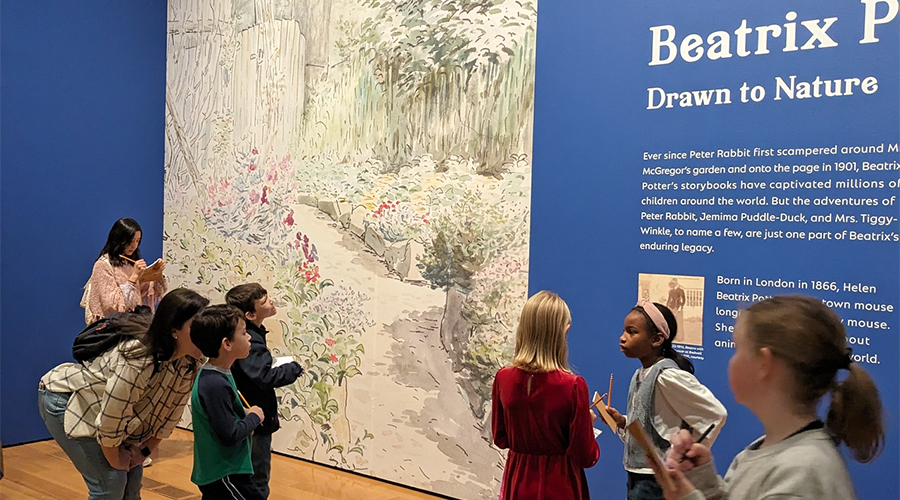
This weekend, my son asked me, "What does Charlotte Mason believe about education?" My response could've gone a lot of directions. For simplicity, I decided the best way to answer this question was to reference another person he was familiar with, "Son, imagine if Beatrix Potter was a teacher and started a school, what do you think it would look like?"
Over the weekend, an impressive group of Stonehaveners followed our Nature Studies aficionado Mrs. Harvey in an exploration of the Beatrix Potter: Drawn to Nature exhibit at the High Museum. The exhibit is a beautiful display of "Beatrix's creative pursuits across illustration, scientific observation, narrative building, and preservation. Discover the boundless creativity, imagination, and curiosity of the woman behind the famous tales." This was a timely reminder for me of our school's love of nature and our desire to create time and space in our schedule for children to stand still before God's creation.
Charlotte Mason believes that, "Children are born naturalists... every child has a natural interest in the living things about him which it is the business of his parents to encourage." As a school partnering with parents, we must take on this responsibility as well. We are to design an academic program that excites our children to appreciate "the marvels of plant and animal life." As we begin a new year, I am excited to recommit our school to this vision and consider the imaginative programs and spaces that we can create to help instill a wonder and awe of God's creation in our children.
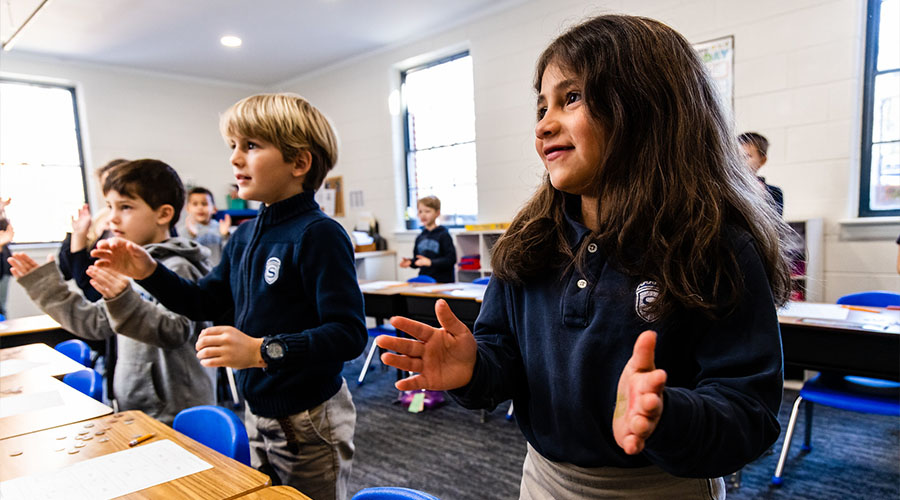
When the wheels get a little wobbly with our children's routines and behaviors in the Edwards household, my wife will often proclaim a return to "Boot Camp week!" This generally means that we put a heavy focus on cleaning, organizing, and any other routines that don't naturally find themselves at the top of our children's to-do lists. Video games, nerf guns, and Legos are put away as we reteach our children the routines we desire to see in our home.
At Stonehaven, we will see a similar return to "Boot Camp" this week as our children return from their Christmas holiday. Before we open up our math books and play soccer on the playground, teachers and staff will retrain their students on the important procedures that form the daily aroma of our school culture. How to walk through our hallways, how to clean up after lunch, how to submit a homework assignment, and how we quickly line up at the end of recess. We know at Stonehaven that when our students aren't following a particular routine, it is more often the result of a lack of training than a lack of knowledge.
In our school's Foundational Commitments, we state that "true education recognizes that hearts and minds are shaped not by ideas and knowledge only but also by practices, habits, routines, and liturgies." New Year's is a perfect opportunity to press the reset button on the habits in our home and the habits in our school. When parents and school can do this at the same time, it can have a powerful impact.
